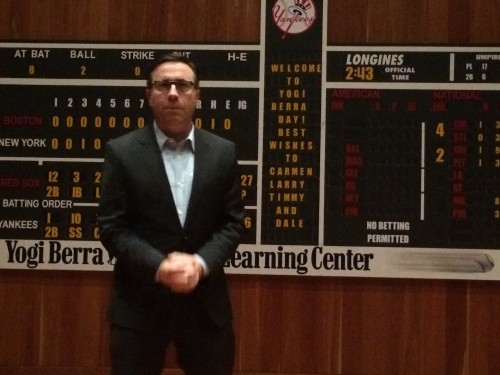
At the screening of “Glickman” at Yogi Berra Museum, Ian Eagle discussed one of his inspirations.
Photo credit: Emma Cimo
Sports radio announcer Marty Glickman didn’t get the chance to achieve Olympic glory at the 1936 Berlin games. However, he was able to create an image for himself that many would come to idolize.
One of the people who grew to admire Glickman was sportscaster Ian Eagle, calling him both a mentor and “a very special guy.” On Thursday, Feb. 11, Eagle discussed the life of Glickman following a screening of the film “Glickman” at the Yogi Berra Museum. Eagle spoke briefly before the screening of the documentary showcasing the life of the late, great sportscaster, saying, “I can still hear him in my head.”
Glickman was the first on the long list of athletes to become sportscasters. Once Glickman’s athletic career came to a close, he picked up a mic and created a legendary broadcasting career for himself announcing the athletic careers of others – not to mention, going down in history as the man who invented the term “swish.”
However, this wasn’t enough for Glickman – he wanted to be better. As the film had mentioned, he was involved with many other programs that were sports for other reasons, “not sports for sports’ sake,’ such as high school games and the Police Athletic League.
When it came to younger sportscasters, he was always willing to share his advice and give his input on how they could improve their skill. Glickman wanted them to be better than he was.
After the film, Eagle laughed while he spoke of some of the advice Glickman had given him. “’Lay off the mayo, you’re getting very jowly,’ and just kept walking – that was it,” making sure to add the fact that he doesn’t even eat mayo.
Eagle couldn’t stress enough how important Glickman was as a mentor to younger sportscasters. Glickman was known for painting a word picture and using particular words while he was broadcasting, Eagle explained. Eagle added how Glickman taught him to consider the human side to broadcasting and to not get to caught up in the statistics.
Glickman was also always both authoritative and conversational in his broadcasts, according to Eagle. This is something Eagle had taken from him and tried to incorporate into his own style. Eagle talked about how important it was for the passion you have for what you doing to be apparent. “If the essence of who you are isn’t coming through, what are you doing there?” he asked.
One of the best pieces of advice Eagle had taken from Glickman was one of the most simple: to consider the audience. Eagle pointed out that sometimes broadcasters become too focused on finding their own “shtick” that they forget why they are there. “Remember why you’re there – remember why you have the headset on,” he said. “Consider the listener – you’re the conduit.”
To quote the film, Glickman’s “wisdom and legacy still resonates.” It’s been 22 years since Eagle first met Glickman, and his impact is obvious. “He pushed me and implored me to be better,” Eagle said.
Eagle is not the only one – Glickman became an influential figure in the lives of sportscasters as a whole. As Eagle said, “It all started with Marty.”


